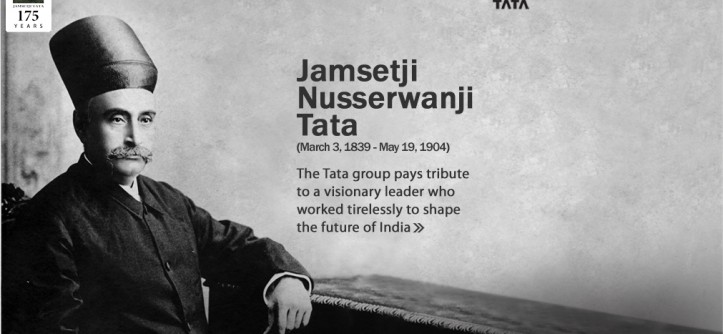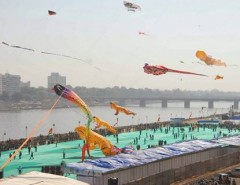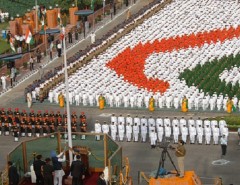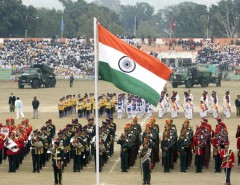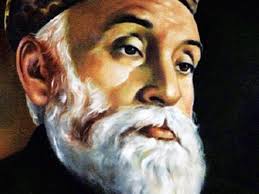 Jamsetji Nusserwanji Tata (3 March 1839 – 19 May 1904) was an Indian pioneer industrialist, who founded the Tata Group, India’s biggest conglomerate company. He was born to a Parsi Zoroastrian family in Navsari then part of the princely state of Baroda.
Jamsetji Nusserwanji Tata (3 March 1839 – 19 May 1904) was an Indian pioneer industrialist, who founded the Tata Group, India’s biggest conglomerate company. He was born to a Parsi Zoroastrian family in Navsari then part of the princely state of Baroda.
He founded what would later become the Tata Group of companies. Tata is regarded as the legendary “Father of Indian Industry”.
“When you have to give the lead in action, in ideas – a lead which does not fit in with the very climate of opinion – that is true courage, physical or mental or spiritual, call it what you like, and it is this type of courage and vision that Jamsetji Tata showed. It is right that we should honour his memory and remember him as one of the big founders of modern India.
Early life
Jamsetji Nusserwanji Tata was born to Nusserwanji and Jeevanbai Tata on 3 March 1839 in Navsari, a city in south Gujarat. His father, Nusserwanji, was the first businessman in a family of Parsi Zoroastrian priests. He broke the tradition to become the first member of the family to try his hand at business. He started an export trading firm in Mumbai.
Jamsetji Tata joined his father in Mumbai at the age of 14 and enrolled at the Elphinstone College completing his education as a ‘Green Scholar’ (equivalent of a graduate). He was married to Hirabai Daboo while he was still a student. He graduated from college in 1858 and joined his father’s trading firm. It was a turbulent time to step into business as the Indian Rebellion of 1857 had just been suppressed by the British government.
Tata made many trips abroad, mainly to England, America, Europe, China, and Japan to establish branches for his father’s business.
Personal life
Tata married Hirabai Daboo. Their sons, Dorabji Tata and Ratanji Tata, succeeded Tata as the chairman of the Tata Group.
Tata’s first cousin was Ratanji Dadabhoy Tata, who played important role in the establishment of Tata Group. His sister Jerbai, through marriage to a Mumbai merchant, became mother of Shapurji Saklatvala, who Tata employed to successfully prospect for coal and iron ore in Bihar and Orissa. Saklatvala later settled in England, initially to manage Tata’s Manchester office, and later became a Communist Member of the British Parliament.
Death
While on a business trip in Germany in 1900, Tata became seriously ill. He died in Bad Nauheim on 19 May 1904, and was buried in the Parsi burial ground in Brookwood Cemetery, Woking, England.
Quotes
Freedom without the strength to support it and, if need be, defend it, would be a cruel delusion. And the strength to defend freedom can itself only come from widespread industrialisation and the infusion of modern science and technology into the country’s economic life.
In a free enterprise the community is not just another stakeholder in the business but in fact the very existence of it.
There is one kind of charity common enough among us… It is that patchwork philanthropy which clothes the ragged, feeds the poor, and heals the sick. I am far from decrying the noble spirit which seeks to help a poor or suffering fellow being… what advances a nation or a community is not so much to prop up its weakest and most helpless members, but to lift up the best and the most gifted, so as to make them of the greatest service to the country.
Be sure to lay wide streets planted with shady trees, every other of a quick-growing variety. Be sure that there is plenty of space for lawns and gardens. Reserve large areas for football, hockey and parks. Earmark areas for Hindu temples, Mohammedan mosques and Christian churches.—Tata in a letter to son Dorab about his vision for the township that would eventually become Jamshedpur.
He was not a man who cared to bask in the public eye. He disliked public gatherings, he did not care for making speeches, his sturdy strength of character prevented from fawning on any man, however great, for he himself was great in his own way, greater than most people realised. He sought no honour and he claimed no privilege, but the advancement of India and her myriad peoples was with him an abiding passion.
While many others worked on loosening the chains of slavery and hastening the march towards the dawn of freedom, Tata dreamed of and worked for life as it was to be fashioned after liberation. Most of the others worked for freedom from a bad life of servitude; Tata worked for freedom for fashioning a better life of economic independence.
That he was a man of destiny is clear. It would seem, indeed, as if the hour of his birth, his life, his talents, his actions, the chain of events which he set in motion or influenced, and the services he rendered to his country and to his people, were all pre-destined as part of the greater destiny of India. —J. R. D. Tata No Indian of the present generation had done more for the commerce and industry of India.
- Born – 3 March 1839
- Died – 9 May 1904
- Country – India
- State – Gujarat
- District – Navsari

